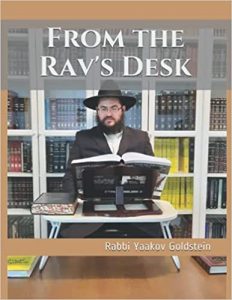
*As an Amazon Associate I earn from qualifying purchases.
Accidentally skipped the Mizmorim of Shabbos said before Baruch Sheamar
- Question:
On Shabbos morning, I absentmindedly said the order of Shacharis that is normally said on a weekday and only noticed my mistake after already concluding Baruch Sheamar. What should I do about the recital of all the Mizmorim that are normally recited prior to Baruch Sheamar, that I had accidentally skipped? Is there an area that I can make them up?
Answer:
This matter is debated amongst the Poskim and depends on your Nussach of Davening. Practically, those who Daven Nussach Arizal or Sephard, and say these Mizmorim prior to Baruch Sheamar, should only make them up after Shemoneh Esrei. [However, there are some Poskim who are lenient to allow the making up of some of these songs within Pesukei Dezimra, even for Nussach Sephard. This especially applies between Yishtabach and Yotzer Or.] Those who Daven Nussach Ashkenaz and recite these Mizmorim after Baruch Sheamar, may make them up anytime prior to the start of the blessing of Yotzer Or, even after Yishtabach has been concluded.
Explanation:
The customary recital of the extra Mizmorim on Shabbos morning is recorded in the Zohar and Rishonim and Poskim. However, its time of institution is unclear, due to there being two different versions in the Zohar. According to one version, these accustomed songs were instituted by the Anshei Kneses Hagedola to be recited, while according to another version of the Zohar, it was instituted after the period of the Anshei Kneses Hagedola, by sages who lived in Talmudic times. The Shaar Hakolel explains that the practical ramification between the two versions is regarding whether or not these extra songs are to be recited after the blessing of Baruch Sheamar, or must be recited beforehand. According to the version that it was instituted by the Anshei Kneses Hagedola, then it may be said after Baruch Sheamar as part of Pesukei Dezimra, and so is the Ashkenazi custom. However, according to the second version, it may not be said as part of Pesukei Dezimra and hence it must be recited prior to Baruch Sheamar and so is the custom of Nussach Sephard and Arizal. However, some Poskim rule that even according to the Sephardic custom to recite the songs prior to Baruch Sheamar, it remains permitted for one to make up the songs after Baruch Sheamar, and especially between Yishtabach and Yotzer Or by which it is permitted for one to make an interval for the sake of a mitzvah, and thereby the Poskim rule that one can make up Nishmas at this point if it was missed. Other Poskim, however, leave this matter in question. Practically, we concluded like the opinion which prohibits making up these songs after Baruch Sheamar [for Nussach Ari and Sephard Daveners] being that 1) These extra Psalms are not an obligation but a voluntary custom which may be skipped if one chooses, and hence in a case of dispute as to whether it can be made up it is better to be stringent and not say it. 2) even according to the lenient opinion, they agree that not all of the Psalms and Piyutim may be recited.
Sources: See Piskeiy Teshuvos 281:3 See regarding the custom of reciting additional Mizmorim by Shacharis of Shabbos: Admur 281:2; Rama 281; Tur 281; Or Zarua Shabbos 42:4; Zohar Teruma 2:136; Abudarham; Levush 281; Shaar Hakolel 19; Piskeiy Teshuvos 281:2; Those who rule that the Mizmorim are to be said after Baruch Sheamar: Admur 281:2; Rama 281; Tur 281;Darkei Moshe 281:1; Those who rule that the Mizmorim are to be said before Baruch Sheamar: Siddur Admur; Rambam in Seder Hatefila; Shaar Hakolel 19; Those who rule that it is forbidden to recite the Mizmorim after Baruch Sheamar: Shaar Hakolel 19:1; Ketzos Hashulchan 83 footnote 2 leaves this matter in question Those who rule that it is permitted to recite the Mizmorim after Baruch Sheamar: Or Letziyon 2:5-1; Shevet Hakehasi 6:64;Chayeh Halevi 2:6; Piskeiy Teshuvos 51:2 and 281:3 and footnote 35 that this applies even according to Nussach Sefard with exception to Mizmor Shir Chanukas Habayis and Haderes Baemuna; See regarding that if one wants he may choose to skip the extra Psalms: Admur 281:2 “nevertheless, all of these recitals are not an obligation and rather is voluntary and if one wishes he does not need to say it at all”; M”A 281:3; See regarding that if one skipped Nishmas then it may be said after Yishtabach: See Birkeiy Yosef 281 in name of Michtam Ledavid 13 “One who forgot to say Nishmas and already said Yishtabach as he is accustomed during the week, is to say Nishmas after Yishtabach,” brought in Shaareiy Teshuvah 281:1; Ben Ish Chaiy Toldos 2; Kaf Hachaim 281:7; See regarding saying verses after Yishtabach: Ateres Zekeinim 56 regarding certain Pesukim that “One may say these verses even between Yishtabach and Yotzer and need not worry of a Hefsek.”; Meorer Yisheinim 183; Piskeiy Teshuvos 54:3; See Admur 54:4 and other Poskim [Rama 54:2; M”A 54:3; Kol Bo 6; Sefer Hamachkim; Orchos Chaim] who all rule that if the Chazan made a Hefsek after Yishtabach he is to repeat some of the Pesukei Dezimra; See regarding that one may make an interval between Yishtabach and Yotzer Or for the sake of a Mitzvah: Admur 51:4; 53:3; 54:3 Michaber and Rama 54:1; Tur in name of Seder Rav Amram Gaon; Kol Bo 4See Shevet Hakehasi 6:65; Kovetz Teshuvos 1:19


Leave A Comment?
You must be logged in to post a comment.